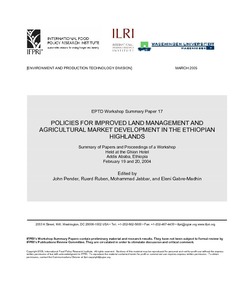Focal point
Location
About IFPRI
The International Food Policy Research Institute (IFPRI) provides research-based policy solutions to sustainably reduce poverty and end hunger and malnutrition in developing countries. Established in 1975, IFPRI currently has more than 500 employees working in over 50 countries. It is a research center of theCGIAR Consortium, a worldwide partnership engaged in agricultural research for development.
Vision and Mission
IFPRI’s vision is a world free of hunger and malnutrition. Its mission is to provide research-based policy solutions that sustainably reduce poverty and end hunger and malnutrition.
What We Do
Research at IFPRI focuses on six strategic areas:
- Ensuring Sustainable Food Production: IFPRI’s research analyzes options for policies, institutions, innovations, and technologies that can advance sustainable food production in a context of resource scarcity, threats to biodiversity, and climate change. READ MORE
- Promoting Healthy Food Systems: IFPRI examines how to improve diet quality and nutrition for the poor, focusing particularly on women and children, and works to create synergies among the three vital components of the food system: agriculture, health, and nutrition. READ MORE
- Improving Markets and Trade: IFPRI’s research focuses on strengthening markets and correcting market failures to enhance the benefits from market participation for small-scale farmers. READ MORE
- Transforming Agriculture: The aim of IFPRI’s research in this area is to improve development strategies to ensure broad-based rural growth and to accelerate the transformation from low-income, rural, agriculture-based economies to high-income, more urbanized, and industrial service-based ones. READ MORE
- Building Resilience: IFPRI’s research explores the causes and impacts of environmental, political, and economic shocks that can affect food security, nutrition, health, and well-being and evaluates interventions designed to enhance resilience at various levels. READ MORE
- Strengthening Institutions and Governance: IFPRI’s research on institutions centers on collective action in management of natural resources and farmer organizations. Its governance-focused research examines the political economy of agricultural policymaking, the degree of state capacity and political will required for achieving economic transformation, and the impacts of different governance arrangements.
Research on gender cuts across all six areas, because understanding the relationships between women and men can illuminate the pathway to sustainable and inclusive economic development.
IFPRI also leads two CGIAR Research Programs (CRPs): Policies, Institutions, and Markets (PIM) andAgriculture for Nutrition and Health (A4NH).
Beyond research, IFPRI’s work includes partnerships, communications, and capacity strengthening. The Institute collaborates with development implementers, public institutions, the private sector, farmers’ organizations, and other partners around the world.
Resources
Displaying 1001 - 1005 of 1521Strategies for Sustainable Land Management in the East African Highlands: Conclusions and Implications
The studies in this book sought to understand the factors affecting rural households’ choice of income strategies and land management practices and the implications of these decisions and of policy- and program-relevant factors for agricultural production, household welfare, and land degradation. We noted at the outset that the factors influencing these decisions and outcomes are many and complex and that their effects may be very context-dependent in a region as diverse as the East African highlands. The findings in the preceding chapters amply support this hypothesis.
Policy analysis for sustainable land management and food security in Ethiopia
Policy Analysis for Sustainable Land Management and Food Security in Ethiopia presents a bioeconomic model of this less- favored area in the Ethiopian highlands. The main reason for selecting this case study area is the unique availability of both biophysical and socioeconomic data covering a period of 15 to 20 years.The data provides a valuable opportunity to analyze the relationships between population pressure, poverty, and land degradation and to test policies for reducing vulnerability and improving sustainable management of the resource base....
The impact of agroforestry-based soil fertility replenishment practices on the poor in Western Kenya
Western Kenya is one of the most densely populated areas in Africa. Farming there is characterized by low inputs and low crop productivity. Poverty is rampant in the region. Yet the potential for agriculture is considered good.
The impact of agroforestry-based soil fertility replenishment practices on the poor in Western Kenya
Western Kenya is one of the most densely populated areas in Africa. Farming there is characterized by low inputs and low crop productivity. Poverty is rampant in the region. Yet the potential for agriculture is considered good. In the study described here, researchers looked specifially at soil fertility replenishment (SFR) systems...Focused on two specific systems -- the tree-based "improved fallow" system and the biomass transfer system -- the study compared rates of adoption in poor and nonpoor communities and evaluated the extent to which their adoption reduced poverty.
Policies for improved land management and agricultural market development in the Ethiopian highlands
“The objectives of this workshop are to review and discuss the main findings and policy implications of recent research conducted on these topics by IFPRI, Wageningen University and Research Center (WUR), the International Livestock Research Institute (ILRI), Mekelle University (MU), the Ethiopian Agricultural Research Organization (EARO) and other Ethiopian collaborators; to discuss options for improving the development of agricultural markets and land management in Ethiopia, considering different stakeholders’ perspectives; and to develop recommendations for priority policy actions and fu







